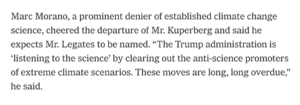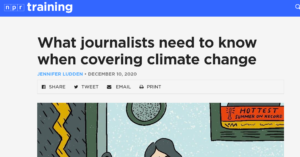https://training.npr.org/2020/12/10/what-journalists-need-to-know-when-covering-climate-change/
Climate change is having an ever greater impact on our lives, not just through extreme weather disasters but also in slowly creeping temperatures and wildly variable weather patterns that hurt agriculture, human health, infrastructure, livelihoods and economies. Journalists should be drawing those connections to help the public understand what’s at stake.
…
When there’s not a specific source or study handy, these facts, compiled by NPR’s climate editors, can provide big-picture context for weather events and other stories. Many are drawn from the latest National Climate Assessment, the gold standard for U.S. climate data until the next such report in 2022.
…………………………
Russell Cook comments: “Journalists should approach the issue with an objective mind and present the opposing arguments, in order for the public and policymakers to make informed decisions about the issue. The above, of course, should be retitled as “What fake ‘journalists’ need to memorize and propagandize when covering climate change.”
#
Related:
‘The Trump Administration is not about to cave to the kind of junk science and emotional greenmail which has held so many Western governments in thrall for the last four decades.’


NYT: Marc Morano, a prominent denier of established climate change science, cheered the departure of Mr. Kuperberg and said he expects Mr. Legates to be named. “The Trump administration is ‘listening to the science’ by clearing out the anti-science promoters of extreme climate scenarios. These moves are long, long overdue,” he said.
…
Myron Ebell, a director at the Competitive Enterprise Institute and a former member of Mr. Trump’s transition team. Mr. Ebell, whose organization has championed the appointment of Dr. [David] Legates and others who question the established science of climate change, said the intention is for him to lead the program while continuing to hold his position at NOAA. “It might be a short-term appointment,” Mr. Ebell said, given the election of President-elect Biden, who has said he will embrace aggressive efforts to tackle climate change. “If he only directs it for two months and a week, then he may not get very far, but let’s see what can get done in two months. Maybe the next administration will throw it all away, but maybe some changes will be adopted, who knows,” Mr. Ebell said.



